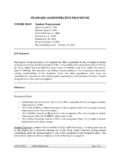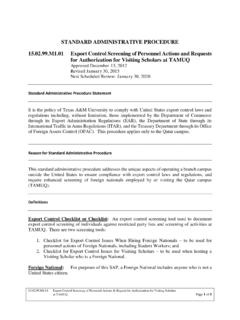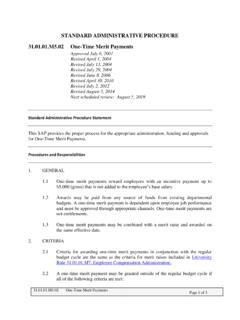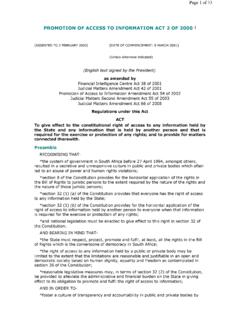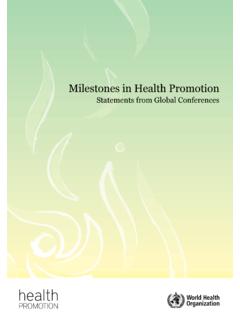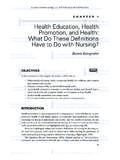Transcription of 12.01.99.M2 University Statement on Academic …
1 University RULE. University Statement on Academic freedom , responsibility , tenure , and promotion Approved June 20, 1997. Revised July 27, 2001. Revised August 18, 2016. Next scheduled review August 18, 2021. Rule Statement The policies for Academic freedom , ethics, responsibility , tenure , and promotion at Texas A&M. University apply equally to current faculty members and to subsequent appointees. These policies seek to establish a spirit of cooperation, good faith, and responsibility and to provide useful guidelines for situations not specifically described in this document. Official Rule Sections include: 1. Faculty Titles 2. Faculty Employment and Annual Review 3. Academic freedom , Ethics and responsibility 4. promotion or tenure 5. Rights of Non-Tenured Faculty 6. Policies Governing the Loss of tenure 7. Reduction or Discontinuance of Institutional Programs 8. Dismissal of Faculty for Cause 9. Non-Tenured tenure -Track Faculty Members Whose Appointments are not Renewed 10.
2 CAFRT. 1. FACULTY TITLES. Definition of Faculty: In general, a faculty member as described in this document is any full-time or part-time employee of Texas A&M University with the following appointments: - Professor, Associate Professor, Assistant Professor University Statement on Academic freedom , responsibility , tenure and promotion Page 1 of 29. -[Adjective] Professor, [Adjective] Associate Professor, [Adjective]. Assistant Professor, such as Clinical, Adjunct, Executive, Instructional, Research, Senior, and Visiting - Professor of the Practice, Associate Professor of the Practice, Assistant Professor of the Practice - Senior Lecturer, Lecturer, Assistant Lecturer - Instructor A faculty member is not automatically eligible for tenure . See Section 2. FACULTY EMPLOYMENT AND ANNUAL REVIEW. Written Terms of Employment: All new faculty members shall be provided with an appointment letter stating the initial terms and conditions of employment. Any subsequent modifications or special understandings in regard to the appointment will be stated in writing and a copy will be given to the faculty member.
3 All faculty members, unless the terms and conditions of their appointment letter state otherwise, are expected to engage in teaching, research or other creative contributions, and service. Some faculty members may negotiate or be assigned to make contributions to any of the three areas, teaching, service, and research or other creative contribution within the context of scholarly engagement. Scholarly engagement is defined as a collaborative and reciprocal relationship between Texas A&M University and key constituencies that involve discovery, integration, translation, and application of knowledge. (a) Essential job functions for a position may vary depending upon the nature of the department in which the faculty member is employed, the nature of the discipline in which the faculty member holds expertise, external funding requirements attached to the position, licensing or accreditation requirements, and other circumstances. It is therefore important that essential job functions for each faculty position be listed in the initial appointment letter.
4 For example, all of the following that are applicable should be listed: teaching responsibilities, responsibilities for advising students, independent and/or collaborative research responsibilities, engaging in patient care, committee assignments, conditions imposed by external accrediting agencies, conditions for holding a named professorship or a position that combines Academic and administrative duties, and any other specific essential functions for the position in question. All appointment letters must indicate whether the appointment being offered is with tenure , tenure -accruing, or non- tenure - accruing. (b) The initial or modified appointment letter for a faculty member with administrative duties should state the portion of the employee's salary that is associated with the administrative duties. The portion of the faculty member's salary not associated with the administrative duties shall be University Statement on Academic freedom , responsibility , tenure and promotion Page 2 of 29.
5 Aligned with the salaries of other faculty with similar qualifications and performing similar duties. The appointment letter for faculty members with administrative duties should also state that the administrative duties may be removed without cause. If the appointment is tenure -accruing, the appointment letter will indicate the length of the period of probationary service at Texas A&M University and state the credit agreed upon for appropriate service at other institutions. The specific probationary period does not, however, constitute the term of the initial appointment. All appointments during the probationary period are for a fixed term of one year or less and are subject to renewal or non-renewal each year of the probationary period. Unless otherwise specified to be less in the initial or annual appointment letter, or mutually agreed upon revision thereof, tenure -accruing appointments and appointments with tenure provide employment for nine months or the equivalent.
6 All faculty members will receive an annual notification of the terms and conditions of appointment for the next fiscal year within two weeks after the Texas A&M University budget has been approved by the Board of Regents or by July 31, whichever is later. This notice shall contain the rank of appointment, tenure status, inclusive dates of employment, salary, and any special conditions. Any changes or additions to essential job conditions and functions noted in the original letter of appointment also should be included, after appropriate consultation with the faculty member. Any changes to the terms and conditions of appointment may be appealed through Rule (Faculty Grievance Procedures Not Concerning Questions of tenure , Dismissal, or Constitutional Rights). Faculty members are obligated to fulfill the terms of employment for the following year, unless they resign prior to 30 days after receiving notification of these terms. Termination of Employment: Notice of non-reappointment, or of intention not to reappoint a faculty member, shall be given in writing in accord with the following standards: tenure Track Faculty: Not later than March 1 of the first Academic year of probationary service, if the appointment expires at the end of that Academic year.
7 Or, if the appointment terminates during an Academic year, at least three months in advance of its termination;. Not later than December 15 of the second year of probationary service, if the appointment expires at the end of that Academic year;. or, if the appointment terminates during an Academic year, at least six months in advance of its termination; and At least twelve months before the expiration of a probationary appointment after two or more years in the institution. University Statement on Academic freedom , responsibility , tenure and promotion Page 3 of 29. Academic Professional Track Faculty (non- tenure track): Academic Professional Track Faculty are those faculty not on the tenure - track who contribute to the mission of the University in more focused ways. Normally APT faculty have a primary responsibility for teaching or research, but may also be expected to contribute in more than a single area of teaching, research or service. An Academic professional track faculty (such as Lecturer or [Adjective] Assistant Professor but excluding Visiting or Adjunct).
8 Who has held any faculty appointment other than Assistant Lecturer for the equivalent of 5 or more Academic years of full-time service within a 7 year period shall be provided a one-year notice if it is the University 's intent not to renew the appointment. This one-year notice shall also apply to Research faculty titles if clearly specified in the offer letter or a reappointment letter; otherwise, the notice period specified in section shall apply. A faculty member promoted to or hired at the rank of Senior Lecturer or a non- tenure track professorial title of Associate Professor or Professor (excluding Visiting or Adjunct), shall be provided a one year notice if it is the University 's intent not to renew the appointment. This one-year notice shall also apply to Research faculty titles if clearly specified in the offer letter or a reappointment letter; otherwise, the notice period specified in section shall apply. A Clinical Assistant Professor (who has held any faculty appointment other than Assistant Lecturer for the equivalent of 5 or more Academic years of full-time service within a 7 year period), Clinical Associate Professor, or Clinical Professor, whose primary faculty responsibility is human patient care, shall be provided with a two (2) month notice if it is the intent of the University not to renew the appointment.
9 This two-month notice shall apply if clearly specified in the offer letter or a reappointment letter; otherwise, a one-year notice period shall apply. Notice of intent not to renew all other faculty who are not on the tenure -track and who have not held an appointment stated in or an appointment stated in or for the stated time period (the equivalent of 5 or more Academic years of full-time service within a 7 year period) shall be given by the Academic departments within a reasonable time from when the department has decided not to renew the appointment. Any request for an exemption to either of these provisions must be based on a major programmatic revision or budgetary cutback. Such a request with appropriate documentation must be submitted by a University Statement on Academic freedom , responsibility , tenure and promotion Page 4 of 29. college dean through the Provost and Executive Vice President to the President for approval. Right of access to personnel files: Generally, faculty members are entitled under Texas law to see their personnel files and to obtain, at their own expense, a copy of the information in these files, with the exception of information concerning the privacy interests of another individual or otherwise made confidential by law.
10 Annual Review: An annual review will be conducted in a timely fashion for all faculty members regardless of their title. The purpose of the annual review is to provide a mechanism to facilitate dialogue between the administration and faculty. The annual review provides the process to evaluate the faculty members' accomplishments in the context of departmental, college and University goals. Annual reviews are to be conducted in an environment of openness and collegiality, with an emphasis on constructive development of the individual faculty member and the institution. The focus of the annual review process will vary by title and rank. For Academic professional track faculty the annual review process will serve primarily as an evaluation focusing on performance and potential for reappointment and promotion . For tenured or tenure -track faculty, the annual review must take into account the fact that progress in a scholarly career is a long-term venture; therefore, a three to five year horizon may be necessary for the accurate evaluation of scholarly progress.


